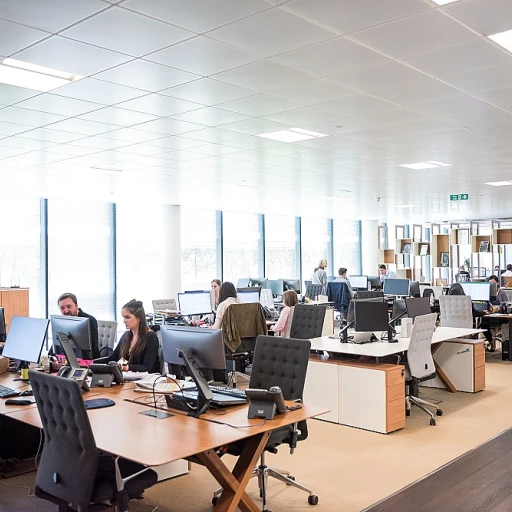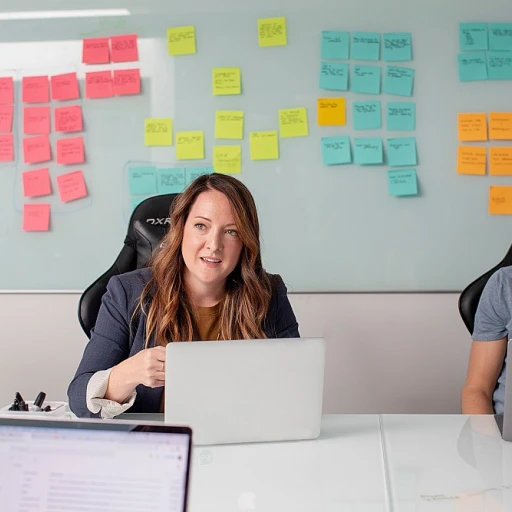
Understanding the Role of a Skills Development Facilitator
Navigating Career Growth with Expert Guidance
A Skills Development Facilitator (SDF) plays a crucial role in reshaping career paths by bridging the gap between employers and employees in the workplace. These facilitators are essential in helping businesses design effective education and training programs tailored to the needs of the workforce. They work hand in hand with companies, ensuring compliance with the regulations set by the Sector Education and Training Authority (SETA) in South Africa. SDFs are instrumental in conducting thorough assessments to identify skill gaps within organizations. By doing so, they assist in crafting a comprehensive workplace skills plan. With their expertise, they spearhead training development initiatives and learning interventions that align with career development objectives. One of the key aspects of an SDF's role is facilitating career growth by directing appropriate development training programs. These programs aim to empower employees with the necessary skills for their professional journey. For anyone looking to understand how mentoring can enhance their reskilling efforts, exploring harnessing the power of electronic mentoring is a step in the right direction. Through their dedication to career advancement, Skills Development Facilitators contribute not only to individual growth but also to the overall success of businesses. As such, staying informed and engaged with the dynamics of skills development is essential for both employers and employees in today's ever-changing job market.The Importance of Reskilling in Today's Job Market
The Crucial Role of Reskilling for Employees and Businesses
Reskilling has become a vital necessity in today’s job market due to rapid technological advancements and evolving industry demands. Businesses are now prioritizing skills development to maintain competitive advantages and ensure compliance with industry standards. This shift towards continuous learning is not only beneficial for organizations but also essential for employees eager to remain relevant and accelerate their career development.
The increased focus on skills development highlights the need for tailored training programs. Many companies are implementing programs that address skills gaps within their workforce, aligning with guidelines set by SETA (Sector Education and Training Authority) in regions like South Africa. These initiatives aim to boost workplace skills through structured learning interventions.
The involvement of a skills development facilitator (SDF) plays a significant role in this process. Facilitators design and execute training development plans that meet both the company's and employees' needs. Through annual training assessments, they identify skill gaps and recommend appropriate training programs.
By acknowledging the importance of strong coaching relationships, companies can offer personalized development initiatives, promoting a culture of continuous learning and agility. As individuals and organizations embrace these dynamic changes, they pave the way for a successful future in the workplace.
How a Skills Development Facilitator Can Guide Your Learning Path
Guidance in Mapping Your Unique Learning Journey
In the fast-paced realm of business, the importance of identifying relevant skills for career transitions has never been more crucial. A Skills Development Facilitator (SDF) plays a pivotal role in helping employees navigate their learning path effectively. Armed with insights into the workplace dynamics and skill gaps, development facilitators focus on creating a personalized development plan that aligns with both the individual’s career goals and the company's strategic needs.
Facilitators utilize their expertise to structure comprehensive training programs that address the specific needs of businesses and their workforce. They leverage their knowledge of sustainable development training to ensure that employees are equipped with the tools necessary for today's competitive job market. Facilitators help in identifying compliance requirements and align them with nationally recognized standards, such as those set by the Sector Education and Training Authority (SETA) in South Africa.
The facilitator's guidance extends beyond just pointing out skill gaps. They invest in creating a structured education training roadmap that involves various learning interventions, whether they be annual training sessions or targeted short-term courses. Notably, employees looking to enhance their career development may consider the pros and cons of short-term classes as part of their reskilling strategy.
Moreover, the facilitator ensures that training initiatives not only focus on immediate needs but also prepare the employees for future roles within the company. This ensures a comprehensive approach to development programs, blending immediate training certification with long-term skill acquisition strategies.
In summary, a Skills Development Facilitator guides employees through the complex landscape of reskilling by crafting a tailored skills plan that bridges the gap between current competencies and future career aspirations.
Identifying the Right Skills for Your Career Transition
Pinpointing Relevant Skills for a Seamless Career Shift
The path towards a successful career transition often begins with identifying the right skills needed for your new role. In today's dynamic job market, skills development is crucial for staying relevant and competitive. As industries evolve, skill gaps emerge, necessitating an informed approach for employees and businesses alike. A skills development facilitator (SDF) plays a pivotal role in guiding individuals through this crucial phase. With expertise in workplace skills planning, facilitators help you assess and understand the skills needed for your career development. They focus on aligning your current capabilities with future workforce demands.- Assessing Skill Gaps: Development facilitators assess existing competencies and identify skill gaps within your current expertise. By understanding these gaps, facilitators tailor education training and development programs to bridge them.
- Tailoring Learning Interventions: Through customized learning interventions and training initiatives, facilitators ensure your education aligns with industry standards and enhances your employability. With a focus on training certification, development facilitators offer programs that comply with regulatory and industry standards, like those set by the South African SETA (Sector Education and Training Authority).
- Collaborating with Business Needs: Facilitating career growth involves more than just the individual. Development facilitators engage with businesses to understand workplace skill requirements, ensuring training programs align with company objectives and compliance needs.
- Annual Training Plans: As part of their role, facilitators help businesses and employees with comprehensive annual training plans, ensuring ongoing skills growth and development. This strategic planning fosters continuous learning and adaptability in the workplace.
Overcoming Challenges in the Reskilling Process
Addressing Reskilling Obstacles in the Workplace
In the evolving landscape of business and employment, reskilling has become a vital necessity. However, the journey to acquiring new skills and competencies is not without its hurdles. Let's dive into common challenges faced in this process and explore ways to overcome them with the help of a skills development facilitator. First and foremost, identifying the specific skill gaps in your career development can be a daunting task. Many employees and businesses find it challenging to pinpoint the exact skills needed to propel career transitions effectively. Here, the role of a facilitator becomes crucial. With expertise in skills development and learning interventions, they can help you accurately assess and address these gaps, ensuring your training programs are both relevant and efficient. Moreover, the proliferation of various training programs and education initiatives can lead to confusion about what’s most beneficial. Facilitators assist in selecting the right development programs tailored to meet compliance standards like those set by SETA (Skills Education Training Authorities) in South Africa. They ensure that your chosen training initiatives align with both your professional goals and the company's strategic objectives. Another significant barrier is resource allocation. Often, businesses struggle to allocate enough resources for annual training and development training due to financial constraints or conflicting priorities. A development facilitator can work with you to design cost-effective, impactful training plans within the constraints of your company’s budget. They can also engage stakeholders to ensure that workplace skills plans receive the necessary support and recognition from management. Time management is another challenge in reskilling, particularly for employees balancing work commitments alongside education. The guidance of a facilitator can streamline this process, helping to integrate learning into the existing workflow. The creation of structured learning schedules and training certification programs can significantly alleviate time pressures, fostering a conducive learning environment. Lastly, maintaining motivation throughout the reskilling journey can be tough. Initial enthusiasm often wanes, particularly if progress is slow or not immediately visible. Development facilitators play an essential role here, also acting as motivators and accountability partners. They track your progress, celebrate milestones, and adjust learning paths when necessary to keep your career development on course. Overcoming these challenges is crucial for facilitating career advancement. With the support of skilled development facilitators, employees and companies can better navigate the dynamic landscape of workplace skills, ensuring both personal growth and business success.Measuring Success in Your Reskilling Journey
Evaluating the Impact of Your Skills Development Journey
Measuring success in your reskilling journey involves more than just checking off completed training programs. It's about analyzing how these new skills translate into tangible career benefits. Here are several ways to gauge the effectiveness of your learning initiatives:
- Alignment with Career Goals: Ensure that your newfound skills align with your career aspirations. Are they helping you move towards your career development objectives and facilitating your career progression?
- Application in the Workplace: Gauge how effectively you can apply your learning in real-world situations. Are you able to contribute more to your workplace? This practical application is a significant indicator of successful skill acquisition.
- Feedback from Colleagues and Supervisors: Valuable insights can be derived from feedback within your workplace. Colleagues and supervisors can offer perspectives on how your performance has improved and where further development might be beneficial.
- Role Evolution: Has your role in the company evolved? Transitioning to roles that require more advanced skills is a marker of success and showcases compliance with the company's skill development objectives.
- Achievement of Training Certification: Obtaining certifications can validate your skills for both internal advancement and external opportunities. Certifications are a recognized form of achievement that business employers value.
Development facilitators can play a pivotal role in helping you identify these success metrics. They aid in aligning your skillset with the skill gaps identified in your workplace skills plan. Through continuous evaluation and education training, you can ensure that your reskilling efforts provide sustainable career benefits. In a constantly evolving job market, maintaining an adaptable skill set is crucial, making the role of an SDF essential in achieving long-term career success.













